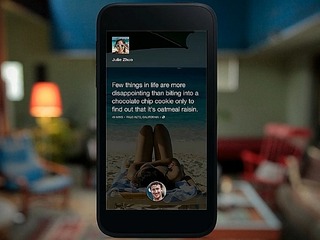Rising infertility concerns fuel growth of male-focused innovative startups
Fertility treatments are more relevant than ever; here are a few startups pioneering new solutions
Read more...
Earlier this week, Facebook introduced Home, its new user interface for Android, which is meant to make phone more people-centric, rather than revolving around apps. This means prominently displaying information from Facebook, including status updates and new pictures, onto the phone’s lockscreen and homepage.
Of course, whenever a social network does anything, there are always going to people who fear that somehow their privacy is being infringed upon. Facebook addressed some of these concerns in a blogpost Friday.
“Since the announcement of Home yesterday, we've received a few questions about how Home works with privacy. Home is software that turns your Android phone into a great, living, social phone. Home doesn't change anything related to your privacy settings on Facebook, and your privacy controls work the same with Home as they do everywhere else on Facebook,” Michael Richter, Chief Privacy Officer of Products, and Eric Egan, Chief Privacy Officer of Policy, wrote.
“We wanted to take this opportunity to answer some questions about how Home works and the data we collect through the service.”
First, they noted, users will still be able to access Facebook on Android, even without Home. Users can also turn Home off, and have the option of not having it appear as their lockscreen.
But here is the important question, and the one is likely being asked most frequently: what information does Home collect exactly?
First there is the stuff you would expect Facebook to collect, like “information when you interact with the service, such as liking or commenting on a post or sending a message,” which should be fairly obvious to anyone who has ever used Facebook
But there is other information that Facebook collects from the phone itself, and this is where people might start to worry: “Facebook maintains a list of the apps that you have in the Home app launcher.”
The information on apps is only stored in identifiable form for 90 days, Facebook explained, and it will only be able to see what apps are being interacted with, and not any information about what is actually done within any apps that are not connected to the network.
Here is how Facebook explained it: “Facebook could see that you launched a map application using the app launcher, but Facebook would not receive information about what directions you searched for or any other activity within the app itself.”
This would only apply to apps that are not already Facebook-enabled, and don’t allow activity to be shared back to the network.
There will be devices that come with Home preinstalled, such as the HTC First, and these will be able to display notifications from apps on the phone. But, once again, Facebook says that it only collects the information about which app is generating the notification, and “not the content of the notification itself,” and any identifying information from this data will be removed after 90 days.
For those concerned about location privacy, Facebook says that Home uses location the same way that the Facebook app does, and can be controlled, and shut off, in the settings of the phone.
What is Home?
Home is a new user interface for Android devices that is neither a hardware device or an operating system. Instead, it is a UI that is meant to change the way people use their phones: by changing them to be centered around people, instead of apps.
It has three features:
(Image source: https://newsroom.fb.com)
Fertility treatments are more relevant than ever; here are a few startups pioneering new solutions
Read more...After a trial in select locations, Elon Musk is expanding its fee to more X users
Read more...The tools include content such as educational videos, recipes, and daily nutrition tips
Read more...
